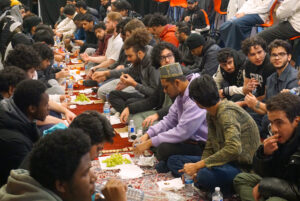Muslim students navigate Ramadan during space and scheduling challenges

As the sun dips below the horizon, Muslim students finally can have their first sip of water or first bite of dates since before dawn. Amidst the challenges of hunger and thirst, they learn self-discipline, gratitude and solidarity to become better versions of themselves.
During Ramadan, fasting from dawn until sunset means abstaining not only from food and water but also from backbiting and speaking to others disrespectfully.
“Relax, control yourselves. That’s how fasting is supposed to be,” said Nibras Khan, the Imam on campus at Algonquin College.
“The whole idea behind fasting is that we’re supposed to be in solidarity with people who don’t have food or water,” said Khan. “At the end of the day, when you have that one sip of water, you will be really thankful and grateful for whatever food and water we have.”
Fasting goes beyond religious concerns. Hussein Jalloul, a Level 2 student in the broadcasting-television and streaming video program, highlights the health benefits of fasting.
“It can help with digestion, give your body a break, and even boost brain function. It’s like hitting the reset button for your system. It’s not just a cultural thing. It’s good for you too,” Jalloul said.
Inspired by the strength and hope found in prayer during times of hardship, Pouya Honarvar became Muslim in a recent Islam event at Algonquin College. His first experience of fasting during Ramadan has deepened his gratitude for having access to daily necessities, like food and water.
“Fasting for my first Ramadan has made me feel grateful and appreciative for the blessings in my life. It serves as a reminder to care for and support the less fortunate in society,” said Honarvar.
However, fasting as college students is not an easy thing. “You need to do the whole day of fasting. And you need to go to classes, do assignments. No water. No drink. You’re tired. Your brain isn’t in there,” said Khan.
Ramadan requires fasting, but it also means balancing work, classes, and daily responsibilities without any concession, such as adjustments to schedules.
With 12 years of Ramadan experience, Jalloul has mastered the art of balancing academic responsibilities with the demands of fasting and prayer during Ramadan.
“It’s all about organizing your day, ensuring you have a balanced schedule that accommodates your fasting, prayer times, and study sessions. Staying hydrated and eating nutritious food,” he said. “You [will] find a rhythm between your spiritual practices and academic responsibilities.”
Another challenge faced by Muslim students is finding suitable food options when breaking their fast. While the Marketplace food court closes at 7 p.m., the Muslim Students Club provides water, dates, and snacks for immediate consumption. However, options for substantial meals are limited, leading students to seek halal alternatives at College Square.

Prayer space in the Spiritual Centre is also a concern for Muslim students on campus.
“For a very long time, the space we were given was not adequate for us as Muslim students,” said Khan.
“We’ve tried to request to the college multiple times that we need a special space for Muslims because there are a lot of Muslim students on campus,” Khan said. “But there was always an excuse. We tried to negotiate, like putting forward a report, a petition from the students, and a letter from all the mosques in Ottawa. And that letter was also put forward and it was basically rejected by the college. It was a very disheartening and unfortunate situation.”
Until recently, the college has been opening room E204 as an additional space to alleviate the growing number of requests for booking at the Spiritual Centre.
“The additional space, which is currently being offered as a short-term solution, is available to be booked as a multi-faith space effective immediately,” said an emailed statement from Algonquin College’s Student Support Services.
However, the problem of limited space remains, especially on Fridays when Muslims must pray in person with the group, or when the main room is booked for other groups.
Currently, Muslims are facing difficulties organizing Friday prayer, according to Khan.
“The Friday prayer is the main issue right now because we don’t have accommodation from next week onwards as that room has been booked by another group,” said Khan. “We try to ask the college. They said that there is no space on campus and the college is not able to accommodate. So, we have to figure some solutions out.”
Despite all the constraints, Muslim students at college remain resilient and optimistic.
“Ramadan for us is a month of worshipping our Lord and connecting with the community,” said Khan. “And it is a month of joy, a month of fun.”








